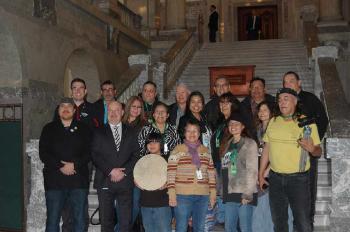Image Caption
By Shari Narine
Windspeaker Contributor
EDMONTON
The promise of an apology from the Alberta government had emotions running high among Sixties Scoop survivors who sat in the legislature on March 16.
“Words cannot describe just the words of acknowledging us on the floor,” said Sharon Gladue, who was taken from her mother on the Thunderchild First Nation when she was two years old.
Gladue was one of about 20 Sixties Scoop survivors and supporters to sit in the public gallery for question period.
Wildrose Indigenous Relations Critic Dave Hanson pushed Premier Rachel Notley and Indigenous Relations Minister Richard Feehan to commit to an apology to the 20,000 Indigenous children caught up in the Sixties Scoop, a federal program implemented by the provinces between 1960 and the early 1990s.
Hanson referred to that period as a “dark hour of our history,” with children removed from their families and communities and placed in non-Indigenous homes throughout the province, Canada and the United States. Some even overseas.
Notley agreed, saying the Sixties Scoop was a “tragedy.”
“We look forward to working with them and some of the members who are here, as well as other Indigenous leaders across the province on how we can move forward with respect to making an apology soon,” she said.
Making an apology is not about “checking off a box,” said Feehan
“We feel that it is very important that we work with the community and Elders and other members of the community who can help us to design a process to move forward, one that is really respectful and truly is an apology,” he said.
Former commissioner for the Truth and Reconciliation Commission and Indian residential school survivor Grand Chief Wilton Littlechild of Treaty 6 said an apology to Sixties Scoop survivors, as well as day scholars is important.
Neither group was included in Prime Minister Stephen Harper’s 2008 apology or in the action that flowed from that apology.
He said it’s also important that Sixties Scoop survivors be intimately involved in the apology process.
“One of the hidden successes of the federal apology is that it engaged (residential school) survivors directly with government to sit down together and draft the apology. The specific wording that was agreed to, I think, really had special meaning in and of its own to survivors to hear those words that they’d been wanting to hear for years, and set them on their own healing journey,” said Littlechild.
An apology to Sixties Scoop survivors is needed for them to begin their healing journey, he said.
“That important, important step of an apology, because it allows us to take the next step and that’s to be able to forgive and when that happens our healing journeys begin,” said Littlechild.
“Initiatives like that need to be applauded.”
During question period, Feehan said the apology has to “have depth.”
Speaking afterwards, Feehan said “depth” meant working with survivors, Elders and community leaders to understand what happened and to take steps to ensure it doesn’t happen again.
He pointed to work already undertaken by his government including involvement in the Murdered and Missing Indigenous Women and Girls national public inquiry; splitting the Human Services Ministry in two and creating a children’s services ministry; establishing a committee to look at the deaths of children in care; and working towards pulling less children into government care; and those who do go into care stay within or in touch with their community.
“That’s the depth work. So it’s not just simply about saying, ‘Sure, we’re going to apologize.’ We want to stand up and say the apology is about changing things, it’s not just about being regretful of the past. It’s about taking a deep eternal commitment now to ensure that this kind of thing is not a legacy for the next generation as well,” said Feehan.
It is important that Sixties Scoop survivors keep the pressure on, said Adam North Peigan, who has been lobbying for the past two years for an apology.
North Peigan approached Hanson after feeling his efforts with the provincial government had stalled. However, North Peigan noted, he had received a call from the Indigenous Relations office for a meeting the very day Hanson rose and asked his question.
North Peigan also instructed survivors to keep pressuring their MLAs and MPs and to make sure politicians understand the solutions need to come from the grassroots and not elected Indigenous officials.
“This is a quiet gathering that’s going to get bigger and bigger,” said Gladue. “When we come back here for the actual apology, we’re hoping we can fill every seat up there (in the public gallery) with Sixties Scoop survivors, but in a healing way because we all need to heal.”
The Manitoba government issued an apology to Sixties Scoop survivors in 2015. Saskatchewan is now talking about doing the same.

